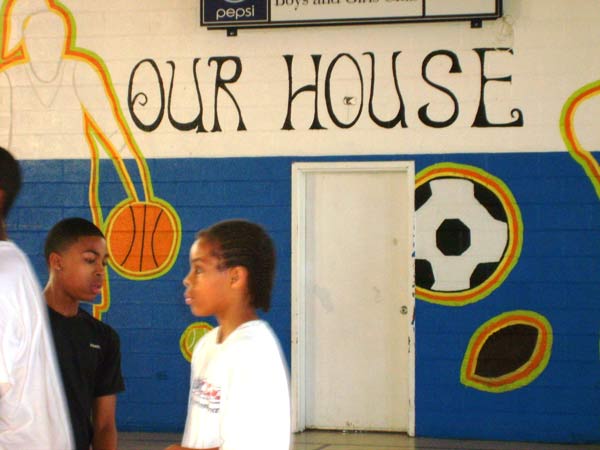By Katie Little
Co-editor
The Durham Voice
When Marian Gordon counts to three, the roar of her rambunctious classroom instantly snaps to silence.
Gordon, a 77-year-old Durham native, has taught at the John Avery Boys and Girls Club for 18 years and said that after almost two decades on the staff she knows what children need to excel.

Members of the John Avery Boys and Girls Club take a break from homework in the club’s gym. The message on the wall illustrates the attachment many members feel toward the club. Photo by Katie Little.
“That honey-sugar-pie stuff doesn’t work,” she said. “I have kids come back and say, Ms. Gordon, I thought you were the meanest person. Now, I think you weren’t mean enough.”
This combination of discipline and compassion is guiding the club into its eighth decade.
As the club celebrates its 70th anniversary this year, it faces the challenge of educating its members during changing times with a limited budget.
Since 1939, the club has offered Durham youth after-school and summer programs. The club, located at 808 E. Pettigrew Street, focuses on the areas of education, health and wellness, fitness, the arts and character building.
The goal of the club is to be a positive place for children, said John Mitterling, the club’s director of development.
“We basically try to do three things every day, and it’s not easy to do them,” Mitterling said. “The first thing is education and, secondly, we do physical education. The final thing is we try to do some sort of education program.”
The Club offers a variety of educational programming designed to suit the changing times and additional challenges youths face in Durham today.
“Certainly, we’ve changed with the times,” said Ervin Hester, the Durham-raised president of the club’s Board of Directors and a former TV news anchorman for Durham’s WTVD. “Durham, North Carolina, is not the same as when I was a teenager.”
Hester, who attended the club as an adolescent, called it a safe haven from the streets of Durham.
The club now offers special programs on gang prevention, sexual education and nutrition to address the most pressing issues that today’s adolescents face.
Cimarron Reed, the outreach and gang prevention coordinator, echoed the importance of educating the children on peer pressures they encounter.
“They’re of that age bracket,” said Reed, a Hartford, Conn., native. “They’re being bombarded with TV, billboards, media about sex.”
To steer children away from unhealthy behavior, the club tries to offer a structured atmosphere where they can thrive.
“They’re good role models — good male role models,” said Rhonda Withers, a single mother whose fourth-grade son has been attending the club since December. “That’s very important for me — that he be around positive male role models.”
Parents such as Withers pay a $10 annual membership for each child to join the club. About 125 to 150 members attend each day, Mitterling said. Scholarships are available if a family is unable to pay the membership fee.
These dues are not sufficient to cover the day-to-day operations of the club. Most of its $800,000 annual budget comes from grants, government funds and corporate donations.
The club is trying to adopt a more assertive development plan and diversify its funding sources. The recent 70th anniversary celebration is part of the club’s plan to increase community awareness of its programs.
The Jan. 28 gala, held at the American Tobacco Campus’ Bay 7, included speeches by Mayor Bill Bell and N.C. Rep. Mickey Michaux, an alumnus of the club, and performances by the club’s band, choir and dance team.
“We are using it as a kickoff to much more of a public presence in the Durham community as we go out and solicit more corporations and individuals in the community,” Mitterling said. “They have to know about you before they’ll fund you.”
The struggling economy has led to increased demand of inexpensive after-school services for Durham parents, Mitterling said. The club would like to accommodate these children, but resources to pay for a building expansion are scarce.
“If you think about the need in North Carolina of children who need affordable after-school care, it’s been a whole lot more than we provide,” he said. “It requires funding and volunteering.”
Hester, who called the program self-sustaining, said any investment in the club would benefit the community too. He said children educated at the club would likely get better jobs later and pay higher taxes. He pointed to several local prominent alumni of the club including Michaux and Chester Jenkins, Durham’s first black mayor.
While Hester said the sluggish economy has made fundraising more difficult, he said he was not worried about the club’s financial ability to continue serving its members.
“When times get tough, the tough get going,” he said.
brittany says:
hi i wannna to know how i become a member to talk to the kids about the gang and alot of stuff kids go trew now get at me asap